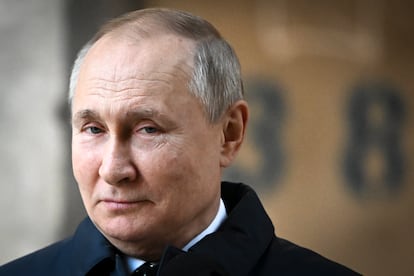Putin’s setbacks are piling up: Six challenges the Kremlin is facing since the invasion of Ukraine
Moscow’s attack was initially presented as a surgical intervention, but is now facing military resistance, an aggressive Western response, Chinese ambiguity and early signs of discontent at home

After several days of the military conflict unleashed by Russia’s invasion of Ukraine, bad news has begun to pile up on President Vladimir Putin’s table. Though it may be too early for an in-depth assessment, there have so far been many setbacks and few victories for Russia. Here is a look at the events through issues related to the military, politics, economics and media [This article was originally published in Spanish on February 28].
1. Ukrainian Armed Resistance
The Russian invading forces have penetrated Ukrainian territory in several of the country’s eastern sectors, coming from the north, east and south. Bursts of missiles – 350 in total up to Sunday, according to the Pentagon – have impaired the capacity of the Ukrainian’s army. On Monday, the Russian agency Interfax reported that attackers took over Berdiansk and Energodar, two small cities in the southeast. Despite its clear military superiority, however, Russia still has yet to achieve any significant victories. It hadn’t conquered any major cities by Monday. According to Western military intelligence, it hadn’t established control over Ukrainian airspace. And it hadn’t managed to significantly undermine the command structure of the Ukrainian forces.
The Ukrainian resistance, meanwhile, remains firm. Information from the invaded country indicates a growing enthusiasm for combat, even in the civil sector. Volunteers are willingly taking up arms. For those who have managed to resist, fueled by an insurmountable motivation, morale is increasing, though morale may be falling for others. Meanwhile, Western countries are replenishing Ukraine’s supply of arms. Turkey has decided to impede the passage of military vessels through the Bosphorous and Dardanelles Straits, which connect the Mediterranean and Aegean to the Black Sea, in accordance with the powers allowed it by the Montreux Convention. The measure affects both Russia and Ukraine, but it will harm Russia more, as the Ukrainian navy is negligible. Russia has deployed a significant military fleet in the Black Sea, but Turkey’s prohibition will impede future movements.
These developments should not invite quick conclusions. It is very early, and given the Ukrainian resistance, the Kremlin could opt to double down on violence and increase its airstrikes. To ensure his victory, Putin could inflict enormous suffering on civilians, as he did in Chechnya, though it would be an unwise option. Each bombed city feeds hatred toward the Kremlin, building hostility that will be difficult to contain in the future.
2. Sanctions
Russia must have foreseen aggressive sanctions from Western countries, which had previously warned of their strategy. It is likely, though, that Moscow did not contemplate the intensity of the ongoing reprisals. Even if it had foreseen the measures, the backlash is notable. Few had anticipated the actions to impede the use of the Russian Central Bank’s reserves, and the strategy could be devastating.
The ruble has fallen sharply, forcing the Central Bank to raise interest rates. Signs of doubt, if not panic, are accumulating around the sustainability of Russian financial entities. Russia can ask for help from China, where 14% of its reserves are deposited in foreign currencies, but Chinese entities may act carefully, fearing secondary Western sanctions that cause problems with access to markets. Moscow may also sell its large gold reserves, but experts say it would not be an easy operation. The situation is critical for Russia.
But there’s more. BP has announced that it will remove its investments in the Russian market – it owns 20% of Rosneft – as done by the Norwegian public fund, the largest in the world. The Australian sovereign fund is also weighing the same option. These steps could lead to a stampede of capital and industrial knowledge. The myriad derivatives that sanctions produce, among them the freezing of airplane leases, which cannot continue beyond the end of March, are beginning to take shape. Beyond the prohibition of flying to European cities, Russian companies face the risk of a serious aircraft shortage. Russian companies own a thousand commercial airplanes, of which half are rented by foreign countries, according to the consultant firm Cirium, as cited by Reuters.
In geopolitical terms, countries including Japan and South Korea are also joining the West’s reprisals.
3. Western Rearmament
The West has not only responded with economic sanctions. It is also taking military measures, confirming the Kremlin’s fears. Most significant is the historic – and, until a few days ago, unthinkable – German aboutface. The government led by Olaf Scholz has announced that it will increase its annual military spending to above 2% GDP from the current rate of 1.5%. Germany will also create a special fund of €100 billion to strengthen the German armed forces. Additionally, the administration has deviated from German tradition by authorizing the delivery of lethal weapons to Ukraine.
After years of an uncertain trajectory, the vigorous reactivation of NATO, and the clear spirit of collaboration among its members, is notable. NATO has sent several rounds of reinforcements to the Eastern front. Putin had sought to push the Alliance away from Russia, but all signs indicate that it will be closer than ever, both now and in the future. Additionally, its actions have another undesired effect for Russia: the giant leap forward in the configuration of the EU as a geopolitical actor. The 27 member states are responding with coordination and speed and branching into unexplored territory, including financing the delivery of arms to Ukraine.
4. Chinese Ambiguity
One of the crucial aspects of Putin’s battle is monitoring international support. The February 4 encounter with China, which crystallized in the China-Russia joint declaration, reinforced the Kremlin’s will to move ahead with the invasion. But Beijing’s attitude has not been satisfactory for Moscow.
The Chinese regime has avoided labeling the Russian offensive as an “invasion.” It maintains the legitimacy of Moscow’s security concerns, and it has condemned Western sanctions. But, significantly, China has opted to abstain, not reject, the condemning resolution in the UN Security Committee, which was not approved because of Russia’s veto. In its declarations, China has repeatedly reiterated its commitment to states’ territorial integrity. It can’t be deduced that Beijing will completely abandon Moscow to its own luck, but there are limits in China’s willingness to cooperate.
On Monday, the UN Security Committee called an extraordinary session of the General Assembly in order to take on the Russian invasion crisis. In such procedural votes, there exists no possibility of veto, so the Russian rejection cannot impede the vote. The meeting will involve a vote on a resolution that will clarify the degree to which Russia will be isolated and that, though nonbinding, will have great political weight.
Some significant details: African countries such as Kenya, instead of remaining indifferent before what can be seen as a faraway battle between powers, see a blow to a post-imperial decolonization process in the aggression against Ukraine. Kazakhstan, whose authoritarian regime has recently received support from Russia after a wave of popular protest, has not followed Moscow in recognizing the independence of the Donbas separatist territories. A Kazakh company in the television and internet sector decided on Monday to block Russian networks, citing a rejection of military propaganda.
5. The Media Battle
The struggle for public opinion also brings bad news for the Kremlin. The news from Ukraine has elicited a deep sense of anger and indignation from Westerners, building a foundation for Western leaders to adopt aggressive measures that may bring problematic consequences for Russia.
In personal terms, additionally, Putin’s image has suffered. The Russian president’s fear of contracting the coronavirus and his servile and inept inner circle – as demonstrated by the pathetic behavior of a high-ranking intelligence official – contrasts starkly with the Ukrainian president, Volodymyr Zelenskiy, who has shown courage, vigor and humanity as he adeptly manages his discourse before the media.
Russia also faces bad news in the world of sport, where isolation and disdain is multiplying. Though the sector has no strategic importance, it has a significant media impact and should not be underestimated.
6. Signs of internal discontent
The internal situation is not reassuring for the head of the Kremlin. Despite the oppressive environment of Russian society, bursts of protests against the war have already begun. They haven’t been massive, but around 6,000 people have been arrested, according to the organization OVD-Info. Some magnates outside of the country have made declarations against the war.
Additionally, lines to withdraw cash from banks began over the weekend. The prospect of uncontrollable inflation and a loss of consumer power is all cranking up the pressure.
We shouldn’t judge the outcome too quickly. Nor can we underestimate Putin’s capacity for control and the regime he has constructed. But it is clear that the first steps of the invasion have been far from a victory march.
Tu suscripción se está usando en otro dispositivo
¿Quieres añadir otro usuario a tu suscripción?
Si continúas leyendo en este dispositivo, no se podrá leer en el otro.
FlechaTu suscripción se está usando en otro dispositivo y solo puedes acceder a EL PAÍS desde un dispositivo a la vez.
Si quieres compartir tu cuenta, cambia tu suscripción a la modalidad Premium, así podrás añadir otro usuario. Cada uno accederá con su propia cuenta de email, lo que os permitirá personalizar vuestra experiencia en EL PAÍS.
¿Tienes una suscripción de empresa? Accede aquí para contratar más cuentas.
En el caso de no saber quién está usando tu cuenta, te recomendamos cambiar tu contraseña aquí.
Si decides continuar compartiendo tu cuenta, este mensaje se mostrará en tu dispositivo y en el de la otra persona que está usando tu cuenta de forma indefinida, afectando a tu experiencia de lectura. Puedes consultar aquí los términos y condiciones de la suscripción digital.









































